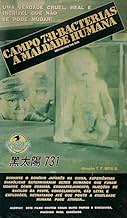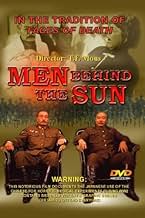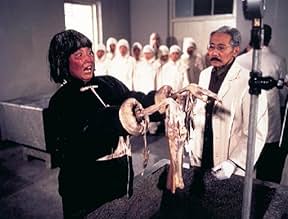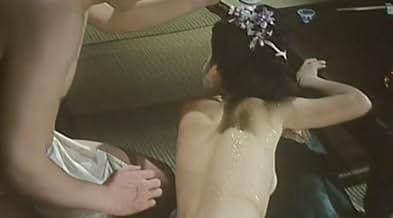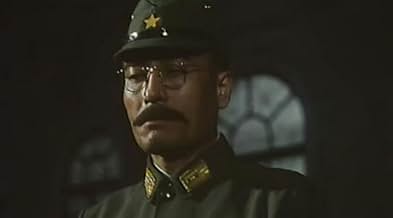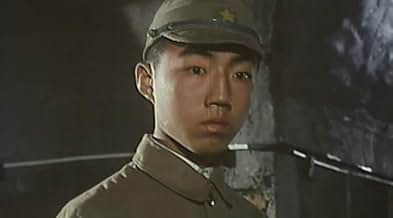IMDb रेटिंग
6.1/10
7.8 हज़ार
आपकी रेटिंग
अपनी भाषा में प्लॉट जोड़ेंJapanese troops round up Chinese and Russian prisoners of war and take them to unit 731, where they're horribly tortured and experimented on to test new biological weapons.Japanese troops round up Chinese and Russian prisoners of war and take them to unit 731, where they're horribly tortured and experimented on to test new biological weapons.Japanese troops round up Chinese and Russian prisoners of war and take them to unit 731, where they're horribly tortured and experimented on to test new biological weapons.
Zhaohua Mei
- Takamura
- (as Zhao Hua Mei)
Runshen Wang
- Camp Lieutenant
- (as Run Shen Wang)
फ़ीचर्ड समीक्षाएं
Please do not watch this movie only for its gory scenes. There aren ´t that many of them and you can see similar ones regularly on Reality TV and the likes. The film´s true driving force is strong acting, good script and the veil of foulness, for the story (and even the gore scenes) are based on true facts and documents. You will certainly be disturbed, but rather for the feeling that what you´re watching really happened. Definetly recommended. 7/10
Going into Men Behind the Sun I knew that it was a serious movie that contained animal cruelty and just some seriously graphic material. And the rumors were true. It contained both. But I wasn't expecting a seriously well-made movie.
Men Behind the Sun centers around Squadron 731 and how it tortured and killed thousands and thousands of people so Japan would have a great chance at winning the war with Russia. Really the movie is almost entirely about how Squadron 731 can improve their chance to win the war. Be it through torture type situations like extreme temperature or through air-borne bacteria. It's been said that while Squadron 731 was up and running, it's said that there wasn't a single survivor. It's not just an hour and forty-five minutes of death and torture, even though it is close. The movie follows a large cast, whether they show the Generals and troops talking about how important this is to Japan or they show the victims and how they need to tell the world what is happening. It's an incredibly strong look at some of the darkest days this world has ever seen. Many a country have committed awful acts, and I suppose this is Japan's. Even though I hear Japan hasn't officially said it took place.
Like I said before, Men Behind the Sun is a strong, powerful and graphic film filled with visuals the average film-goer would rather not see. Truthfully, there's a couple scenes I'd rather have not have seen. There's another comment on here that says "One Viewing Is Enough" and I can't agree more. The only people I would recommend this movie to are history/movie/gore buffs. 8.5 outta 10
Men Behind the Sun centers around Squadron 731 and how it tortured and killed thousands and thousands of people so Japan would have a great chance at winning the war with Russia. Really the movie is almost entirely about how Squadron 731 can improve their chance to win the war. Be it through torture type situations like extreme temperature or through air-borne bacteria. It's been said that while Squadron 731 was up and running, it's said that there wasn't a single survivor. It's not just an hour and forty-five minutes of death and torture, even though it is close. The movie follows a large cast, whether they show the Generals and troops talking about how important this is to Japan or they show the victims and how they need to tell the world what is happening. It's an incredibly strong look at some of the darkest days this world has ever seen. Many a country have committed awful acts, and I suppose this is Japan's. Even though I hear Japan hasn't officially said it took place.
Like I said before, Men Behind the Sun is a strong, powerful and graphic film filled with visuals the average film-goer would rather not see. Truthfully, there's a couple scenes I'd rather have not have seen. There's another comment on here that says "One Viewing Is Enough" and I can't agree more. The only people I would recommend this movie to are history/movie/gore buffs. 8.5 outta 10
Watching 'Men Behind The Sun' is a very odd experience, because it's difficult to tell what exactly it is trying to achieve. On the surface it is presented as a supposedly serious expose of some of the little known war crimes committed by the Japanese in WW2. But it is made in such a trashy way (compounded by the badly dubbed copy I watched) that it comes across closer to an 'Ilsa, She-Wolf Of The SS' exploitation movie, minus the sex.
The reason this movie is so notorious is mainly because of a handful of scenes. One sequence, the frostbite experiment, is shocking, but obviously special effects, so gorehounds will treat it like a Romero or Fulci gore scene. However, two others, the autopsy scene, and the decompression chamber scene, appear to use real corpses. These are gruesome but strangely fascinating. What really pushes this movie over the edge though are the two scenes which involve animal abuse. One is very short but involves a horde of fleeing rats being burned alive. This scene is obviously real. The other is the notorious segment which involves a cat being eaten alive by rats. This appears to be real, and if it is, it's the most reprehensible thing I've ever seen in a movie. If it is faked it is one of the most convincing special effects I've ever watched, and even so, the cat is obviously highly distressed.
I must admit I still don't know what to think about this movie. If the film makers genuinely intended this to be a serious look at Japanese atrocities I would applaud it for bringing to attention a disgusting series of events that should not be forgotten. However, as I am dubious about their sincerity, I remain nonplussed. I can't really get all high and mighty about it, because after all I did watch the thing, and therefore I would feel like a hypocrite for having done so. All I can say is that if you want to see an extreme piece of film making and are not easily disturbed, 'Men Behind The Sun' is truly unforgettable.
The reason this movie is so notorious is mainly because of a handful of scenes. One sequence, the frostbite experiment, is shocking, but obviously special effects, so gorehounds will treat it like a Romero or Fulci gore scene. However, two others, the autopsy scene, and the decompression chamber scene, appear to use real corpses. These are gruesome but strangely fascinating. What really pushes this movie over the edge though are the two scenes which involve animal abuse. One is very short but involves a horde of fleeing rats being burned alive. This scene is obviously real. The other is the notorious segment which involves a cat being eaten alive by rats. This appears to be real, and if it is, it's the most reprehensible thing I've ever seen in a movie. If it is faked it is one of the most convincing special effects I've ever watched, and even so, the cat is obviously highly distressed.
I must admit I still don't know what to think about this movie. If the film makers genuinely intended this to be a serious look at Japanese atrocities I would applaud it for bringing to attention a disgusting series of events that should not be forgotten. However, as I am dubious about their sincerity, I remain nonplussed. I can't really get all high and mighty about it, because after all I did watch the thing, and therefore I would feel like a hypocrite for having done so. All I can say is that if you want to see an extreme piece of film making and are not easily disturbed, 'Men Behind The Sun' is truly unforgettable.
Man Behind the Sun is a worthy film, and readily smeared through its association with a number of schlock "sequels".
Given that most reviewers here can't read Chinese and are measuring the film by its disgust factor, it's easy to see why "Godfrey Ho" is wrongly credited with directing it, instead of just "parts" 2 and 3. The actual director, Mou Tun-fei (aka T.F. Mous) is alive and well and living in Taiwan at last report. He is also a committed Chinese nationalist, which helps to explain the genuine, almost uncontrollable anger in this film.
The "sequels" on the other hand are money-spinners. Anyone who has seen the original should know there was no scope for a sequel set in a camp that had already been destroyed at the conclusion of WWII. At best, "part" 2 is a remake, and a cheap, shabby one at that.
The film is also careful to note significant historical elements, such as how the US government protected some of the criminals portrayed in this film, partly in order to get hold of the scientific data produced at the expense of the lives of thousands of Chinese civilians. If you read books on the matter you will also discover that the vast majority of Japanese scientists implicated in these experiments went on to enjoy successful careers in Japanese universities.
There was no Simon Wiesenthal to chase up and prosecute these individuals, despite their conspicuous presence under a lengthy US administration, and to this day the two governments prefer not to talk about this particularly vile component of Japan's wartime legacy. "Stuff happens," eh Mr Rumsfeld?
Given that most reviewers here can't read Chinese and are measuring the film by its disgust factor, it's easy to see why "Godfrey Ho" is wrongly credited with directing it, instead of just "parts" 2 and 3. The actual director, Mou Tun-fei (aka T.F. Mous) is alive and well and living in Taiwan at last report. He is also a committed Chinese nationalist, which helps to explain the genuine, almost uncontrollable anger in this film.
The "sequels" on the other hand are money-spinners. Anyone who has seen the original should know there was no scope for a sequel set in a camp that had already been destroyed at the conclusion of WWII. At best, "part" 2 is a remake, and a cheap, shabby one at that.
The film is also careful to note significant historical elements, such as how the US government protected some of the criminals portrayed in this film, partly in order to get hold of the scientific data produced at the expense of the lives of thousands of Chinese civilians. If you read books on the matter you will also discover that the vast majority of Japanese scientists implicated in these experiments went on to enjoy successful careers in Japanese universities.
There was no Simon Wiesenthal to chase up and prosecute these individuals, despite their conspicuous presence under a lengthy US administration, and to this day the two governments prefer not to talk about this particularly vile component of Japan's wartime legacy. "Stuff happens," eh Mr Rumsfeld?
Watch Man Behind the Sun expecting something along the lines of a Chinese Ilsa movie and you might be in for a surprise: this film has none of the camp qualities to be found in most POW exploitationit's pure cinematic harshness from start to finish with not a buxom leather-booted commandant in sight.
Set at the end of WWII, director T. F. Mous' harrowing tale centres on Camp 731, a medical centre where the Japanese attempt to perfect bacterial weapons, using Chinese prisoners as guinea pigs in their nasty experiments. Mous' objective is to reveal to the world how his people suffered at the hands of their enemy, and in this he totally succeeds; the atrocities that are depicted in Man Behind The Sun are completely sickening and disgustingly convincing.
From the moment that a woman's baby is smothered in snow by a soldier, to the depressing, downbeat finalé in which the camp is razed to the ground by a retreating Japanese army (after shooting and burning all prisoners), this unflinching portrayal of man's inhumanity to man is a total gut-wrencher and certainly not recommended viewing for the easily offended.
In this film, people are treated worse than animals and the 'experiments' they have to endure are shown in every nauseatingly graphic detail: a woman has her arms frozen and then dunked in hot water, allowing the flesh to be easily ripped from her bones; a prisoner is placed in a decompression chamber resulting in his intestines erupting from his body (a scene rumoured to use a real body, but which, according to the director, was actually achieved using special effects); a boy is tricked into being the subject of a live 'autopsy' (cast-iron stomach necessary for this bitreal autopsy footage was shot for this scene!!); and a group of prisoners are 'crucified' in a field and used for target practice by Japanese bombers.
On top of all this there are also two moments of animal cruelty that will have pet-lovers up in arms: a cat is thrown to hungry rats and is eaten alive (not sure if this was done with FX or not, but the cat doesn't look too thrilled), and a load of rats are also set on fire (now this is definitely real!!).
As you have probably gathered, Man Behind The Sun is hard going and should be watched with caution. However, it is a well made film that does what it set out do doeducate viewers about the horrors of war. It's a hard one to rate, because it is such a gruelling movie and can't really be described as entertaining, but I'll give it 8/10 for being so genuinely disturbing.
Set at the end of WWII, director T. F. Mous' harrowing tale centres on Camp 731, a medical centre where the Japanese attempt to perfect bacterial weapons, using Chinese prisoners as guinea pigs in their nasty experiments. Mous' objective is to reveal to the world how his people suffered at the hands of their enemy, and in this he totally succeeds; the atrocities that are depicted in Man Behind The Sun are completely sickening and disgustingly convincing.
From the moment that a woman's baby is smothered in snow by a soldier, to the depressing, downbeat finalé in which the camp is razed to the ground by a retreating Japanese army (after shooting and burning all prisoners), this unflinching portrayal of man's inhumanity to man is a total gut-wrencher and certainly not recommended viewing for the easily offended.
In this film, people are treated worse than animals and the 'experiments' they have to endure are shown in every nauseatingly graphic detail: a woman has her arms frozen and then dunked in hot water, allowing the flesh to be easily ripped from her bones; a prisoner is placed in a decompression chamber resulting in his intestines erupting from his body (a scene rumoured to use a real body, but which, according to the director, was actually achieved using special effects); a boy is tricked into being the subject of a live 'autopsy' (cast-iron stomach necessary for this bitreal autopsy footage was shot for this scene!!); and a group of prisoners are 'crucified' in a field and used for target practice by Japanese bombers.
On top of all this there are also two moments of animal cruelty that will have pet-lovers up in arms: a cat is thrown to hungry rats and is eaten alive (not sure if this was done with FX or not, but the cat doesn't look too thrilled), and a load of rats are also set on fire (now this is definitely real!!).
As you have probably gathered, Man Behind The Sun is hard going and should be watched with caution. However, it is a well made film that does what it set out do doeducate viewers about the horrors of war. It's a hard one to rate, because it is such a gruelling movie and can't really be described as entertaining, but I'll give it 8/10 for being so genuinely disturbing.
क्या आपको पता है
- ट्रिवियाDirector Tun-Fei Mou paid a lot of attention to the film's historical accuracy and sought to create something that very earnestly captured his true-life source material doing years of research. He chose actors who purposely resembled Japanese people of the war era and even cast Korean kids living in China to play the Youth Corp as Mou thought Koreans most resembled Japanese kids of that era. Mou filmed the movie in Harbin, Manchuria where 731 was stationed. He used 731's real headquarters as a location, it was a school at the time of the shoot. When Mou took down the school's name and put the Japanese flag back, it horrified the local elderly who had lived through the war. One particularly upset old lady approached Mou and his crew and said "I knew they'd be back (the Japanese), I just hoped it wouldn't be this soon!"
- गूफ़Surgeons cut the stomach of an alive boy without any bleeding.
- भाव
Dr. Shiro Ishii: A small rat can beat a cat. Fleas and germs can defeat bombers and guns. This is... the basic theory behind Squadron 731. It is also my philosophy.
- इसके अलावा अन्य वर्जनThe UK version was cut by 2 minutes by the BBFC to remove a scene where a cat is thrown into a room full of live rats and then killed by them, and to edit shots of rats on fire. Despite the film's graphic violence it received no further BBFC cuts, possibly because the video was given a limited UK release and sold only through Chinese video stores.
- कनेक्शनEdited into Hei tai yang 731 si wang lie che (1994)
टॉप पसंद
रेटिंग देने के लिए साइन-इन करें और वैयक्तिकृत सुझावों के लिए वॉचलिस्ट करें
- How long is Man Behind the Sun?Alexa द्वारा संचालित
विवरण
इस पेज में योगदान दें
किसी बदलाव का सुझाव दें या अनुपलब्ध कॉन्टेंट जोड़ें

![Trailer [OV]](https://m.media-amazon.com/images/M/MV5BNzc1ZjYwZmItOTQ3Yy00NjBkLWE2OGYtMDJkZTU0M2UwYzEwXkEyXkFqcGdeQWxiaWFtb250._V1_QL75_UX500_CR0)
